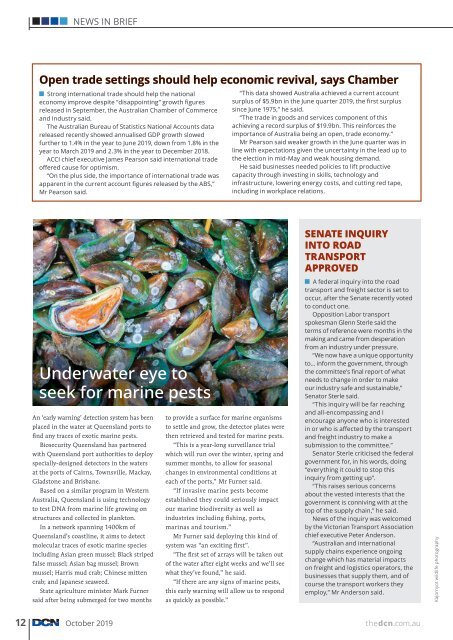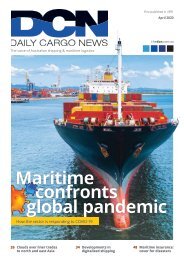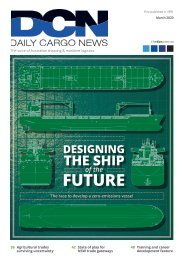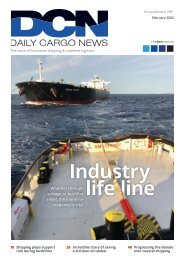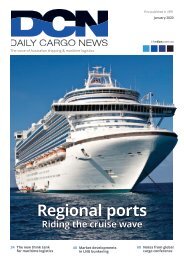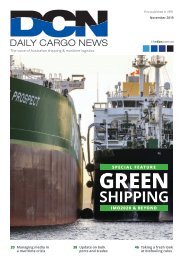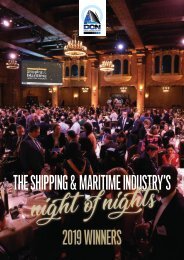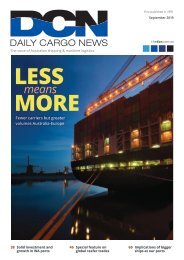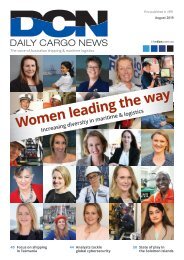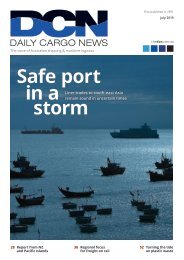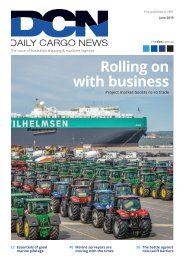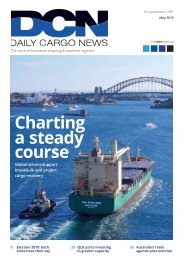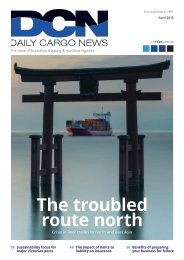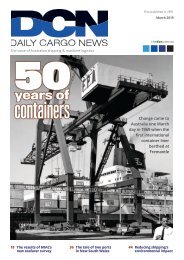DCN October Edition 2019
You also want an ePaper? Increase the reach of your titles
YUMPU automatically turns print PDFs into web optimized ePapers that Google loves.
NEWS IN BRIEF<br />
Open trade settings should help economic revival, says Chamber<br />
Strong international trade should help the national<br />
economy improve despite “disappointing” growth figures<br />
released in September, the Australian Chamber of Commerce<br />
and Industry said.<br />
The Australian Bureau of Statistics National Accounts data<br />
released recently showed annualised GDP growth slowed<br />
further to 1.4% in the year to June <strong>2019</strong>, down from 1.8% in the<br />
year to March <strong>2019</strong> and 2.3% in the year to December 2018.<br />
ACCI chief executive James Pearson said international trade<br />
offered cause for optimism.<br />
“On the plus side, the importance of international trade was<br />
apparent in the current account figures released by the ABS,”<br />
Mr Pearson said.<br />
“This data showed Australia achieved a current account<br />
surplus of $5.9bn in the June quarter <strong>2019</strong>, the first surplus<br />
since June 1975,” he said.<br />
“The trade in goods and services component of this<br />
achieving a record surplus of $19.9bn. This reinforces the<br />
importance of Australia being an open, trade economy.”<br />
Mr Pearson said weaker growth in the June quarter was in<br />
line with expectations given the uncertainty in the lead up to<br />
the election in mid-May and weak housing demand.<br />
He said businesses needed policies to lift productive<br />
capacity through investing in skills, technology and<br />
infrastructure, lowering energy costs, and cutting red tape,<br />
including in workplace relations.<br />
SENATE INQUIRY<br />
INTO ROAD<br />
TRANSPORT<br />
APPROVED<br />
Underwater eye to<br />
seek for marine pests<br />
An ‘early warning’ detection system has been<br />
placed in the water at Queensland ports to<br />
find any traces of exotic marine pests.<br />
Biosecurity Queensland has partnered<br />
with Queensland port authorities to deploy<br />
specially-designed detectors in the waters<br />
at the ports of Cairns, Townsville, Mackay,<br />
Gladstone and Brisbane.<br />
Based on a similar program in Western<br />
Australia, Queensland is using technology<br />
to test DNA from marine life growing on<br />
structures and collected in plankton.<br />
In a network spanning 1400km of<br />
Queensland’s coastline, it aims to detect<br />
molecular traces of exotic marine species<br />
including Asian green mussel; Black striped<br />
false mussel; Asian bag mussel; Brown<br />
mussel; Harris mud crab; Chinese mitten<br />
crab; and Japanese seaweed.<br />
State agriculture minister Mark Furner<br />
said after being submerged for two months<br />
to provide a surface for marine organisms<br />
to settle and grow, the detector plates were<br />
then retrieved and tested for marine pests.<br />
“This is a year-long surveillance trial<br />
which will run over the winter, spring and<br />
summer months, to allow for seasonal<br />
changes in environmental conditions at<br />
each of the ports,” Mr Furner said.<br />
“If invasive marine pests become<br />
established they could seriously impact<br />
our marine biodiversity as well as<br />
industries including fishing, ports,<br />
marinas and tourism.”<br />
Mr Furner said deploying this kind of<br />
system was “an exciting first”.<br />
“The first set of arrays will be taken out<br />
of the water after eight weeks and we’ll see<br />
what they’ve found,” he said.<br />
“If there are any signs of marine pests,<br />
this early warning will allow us to respond<br />
as quickly as possible.”<br />
A federal inquiry into the road<br />
transport and freight sector is set to<br />
occur, after the Senate recently voted<br />
to conduct one.<br />
Opposition Labor transport<br />
spokesman Glenn Sterle said the<br />
terms of reference were months in the<br />
making and came from desperation<br />
from an industry under pressure.<br />
“We now have a unique opportunity<br />
to... inform the government, through<br />
the committee’s final report of what<br />
needs to change in order to make<br />
our industry safe and sustainable,”<br />
Senator Sterle said.<br />
“This inquiry will be far reaching<br />
and all-encompassing and I<br />
encourage anyone who is interested<br />
in or who is affected by the transport<br />
and freight industry to make a<br />
submission to the committee.”<br />
Senator Sterle criticised the federal<br />
government for, in his words, doing<br />
“everything it could to stop this<br />
inquiry from getting up”.<br />
“This raises serious concerns<br />
about the vested interests that the<br />
government is conniving with at the<br />
top of the supply chain,” he said.<br />
News of the inquiry was welcomed<br />
by the Victorian Transport Association<br />
chief executive Peter Anderson.<br />
“Australian and international<br />
supply chains experience ongoing<br />
change which has material impacts<br />
on freight and logistics operators, the<br />
businesses that supply them, and of<br />
course the transport workers they<br />
employ,” Mr Anderson said.<br />
Kajornyot wildlife photography<br />
12 <strong>October</strong> <strong>2019</strong><br />
thedcn.com.au


